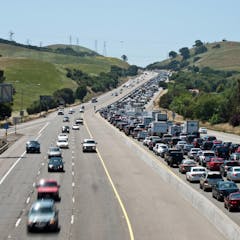
Articles on Environmental footprint
Displaying all articles

Four graphs that show us how humanity’s impact on the planet is growing.

Shall I order the chicken, or the salmon? What does the science say about reducing pressure on the environment? When you take a big-picture view, the results can be surprising.

As the FIFA World Cup kicks off, researchers take a look at the impact of climate change on the future of soccer.

Environmental footprint calculators may promise to help consumers lead a greener life. But they may in fact encourage choices that don’t benefit – or even harm – the environment.

A new study puts numbers to the health and environmental benefits – or impacts – of individual foods and shows how small changes can make a significant difference.

Six hours of streaming video may be the equivalent of burning one litre of petrol.

To be clear, I’m not advocating compulsory population control, here or anywhere. But we do need to consider a future with billions more people, many of them aspiring to live as Australians do now.

The adverse environmental impacts of academic travel are known. It is now up to institutions to determine how to adapt to these impacts.

July 29, 2019 is ‘Earth Overshoot Day,’ a date coined by the nonprofit Global Footprint Network to publicize overuse of Earth’s resources. But their estimates may actually understate the problem.

August 1, 2018 is ‘Earth Overshoot Day,’ a date coined by the nonprofit Global Footprint Network to publicize overuse of Earth’s resources. But their estimates actually understate the problem.

Cognitive dissonance: scholars need to confront the undeniable conflict of pushing for action on climate change, while maintaining a high-energy lifestyle.

Food is a big part of everyone’s carbon footprint – about the same as electricity use. How can our diet make farming more planet-friendly?

A philosopher’s thoughts on how an individual can overcome the feeling of helplessness in the face of global climate change.
